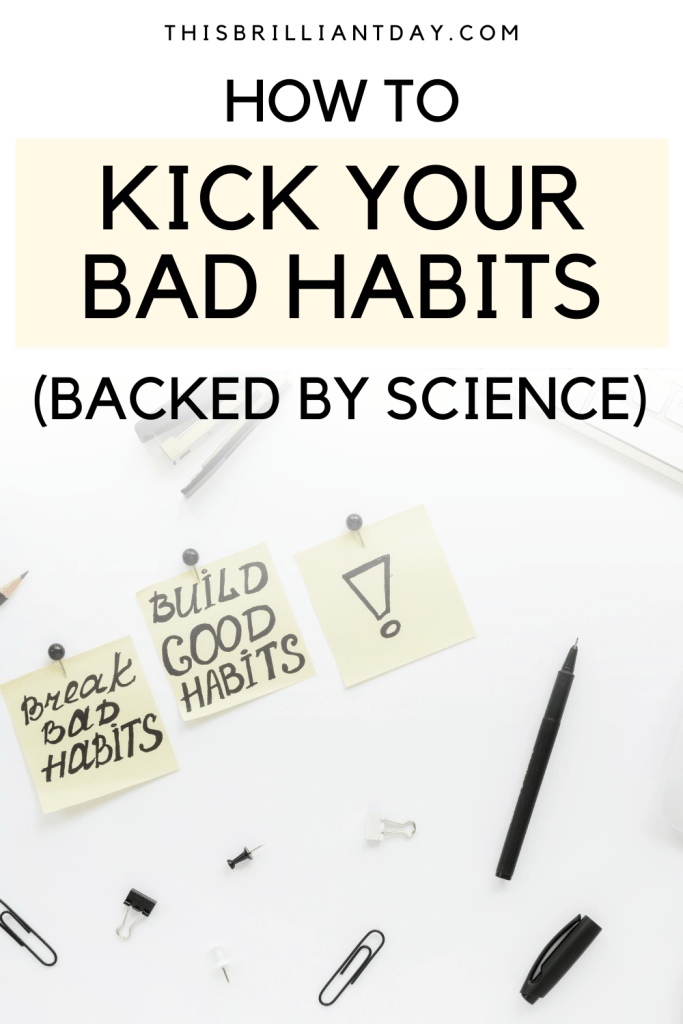This is a collaborative post.
If everyone in the world could kick their bad habits, it would be an extraordinarily different place. We’d be wealthier, happier, and dramatically more content with our lives.
Unfortunately, eliminating these problem behaviours is surprisingly challenging. Getting people to turn their backs on things they’ve done for years and embrace something new isn’t straightforward, either practically or psychologically.
Fortunately, science offers some hope and guidance on the matter. Researchers have explored various methods people can use to kick their bad habits and put their lives back on track. So what do they recommend?

How To Kick Your Bad Habits (Backed By Science)
Generate Accountability
One popular and powerful method is to find ways to generate accountability. Telling family and friends you want to achieve something makes it significantly more likely you’ll get the outcome you want.
For example, if you want to quit smoking, telling everyone in your social circle that that’s what you’re doing can make it much easier to achieve. Everyone will support you, from refraining from smoking around you to keeping a Nicorette inhaler on hand if you need it.
Be Mindful
You can also kick your bad habits by being more mindful. Instead of operating on autopilot and doing what you normally do, you can take time to pause whenever you notice yourself doing something you shouldn’t.
Being mindful is also an excellent way to keep track of your emotions, particularly those that precede you wanting to engage in a bad habit. Once you understand your triggers, you are in a far better place to defend against them.

Educate Yourself About Your Habits
Another strategy is to educate yourself about your habits to identify causes, patterns, and triggers. Once you have a better understanding of how they work, you are in a superior position to defend yourself.
For example, finding out why you have a particular habit can help you put it into context. For instance, you might have a bad habit of going out for fast food in the evening. If the catalyst for that is being too tired to cook when you get home, look for alternative options. For example, you could try prepping your dinner in the morning or eating a big lunch and skipping dinner entirely.
You can also research what works to break the bad habits you have. Look for specific strategies people are using and find out what makes them effective. Knowing them could help you kick your bad habits faster.
Change Your Lifestyle
You can also look for ways to change your lifestyle from the ground up to make your bad habits less tempting. For example, if you feel tired all the time, you might not want to cook dinner and instead get a takeout. But if you feel lethargic because of the food you are putting in your body, that’s a vicious cycle that’s hard to prevent.
Changing your lifestyle from the ground up helps shift the situation back in your favor. Once you feel good on the inside, you’re in a superior position to tackle challenges on the outside.
Get Professional Help
You may also find it more manageable to kick your bad habits by getting professional help. Counsellors, therapists, and even medical doctors have techniques and strategies they can offer to assist you in your journey toward a healthier and more fulfilling lifestyle. In some cases, they may provide medication to take away the worst of your cravings and get you through the most challenging parts of the journey.

Make Gradual Changes
Another technique is to try making gradual changes instead of going the whole hog. Small adjustments are often more sustainable than major behaviour reversals for some bad habits (though not all).
Say, for instance, you want to change your diet for the better. Instead of going whole food, plant-based from day one, you might introduce changes over a couple of months to acclimatise your body to the situation.
For instance, you might begin with something simple, like eating oatmeal and berries for breakfast. Then, you might replace meat with beans and start cooking more food from scratch instead of getting it out of packets.
Reward Yourself
Finally, you can try consolidating wins by rewarding yourself whenever you achieve a major milestone. Reinforcing the idea that you’ve done a good job is a great way to feel good about your achievements so that they continue for the long term.
Just ensure you avoid turning rewards into bad habits themselves. Sure, you want to feel good, but you don’t want to replace smoking with a sugary drink addiction or another drug problem.



